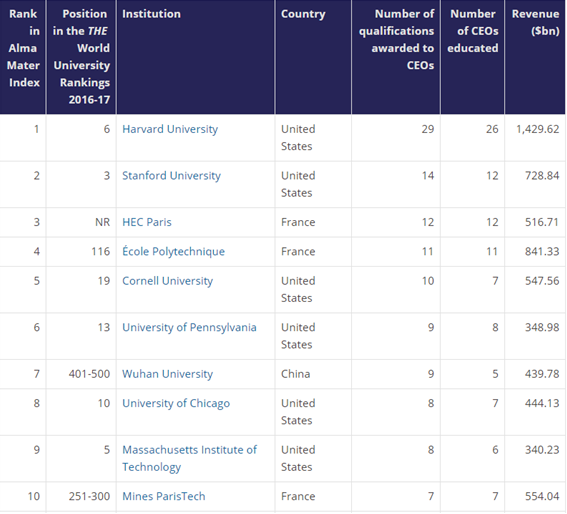The Top 100 Universities in Alma Mater Index (Global Executives) 2017, newly published by Times Higher Education, ranks universities according to the number of qualifications they have awarded to chief executives who are on the Fortune Global 500 list of companies.
17 universities in China are listed in the index, among which Wuhan University (WHU) ranks at the top with 9 qualifications in total conferred to chief executives. WHU is also the only university in the Asian area that is in the top 10. The other 16 universities are CEIBS College (26), Shandong University (27), Tsinghua University (30), Nankai University (31), China University of Petroleum (35), Southwest Jiaotong University (57), Harbin Institute of Technology (58), Harbin Engineering University (59), Peking University (61), Dongbei University of Finance and Economics (61), Xi’an Jiaotong University (69), HeFei University of Technology (71), University of Science and Technology Beijing (78), Huazhong University of Science and Technology (83), Shanghai Jiaotong University (87) and Northwestern Polytechnical University (99).
The university that had educated the greatest number of chief executives is Harvard University, which has conferred 29 qualifications (including bachelor and master degrees, as well as doctorates and other postgraduate qualifications) to 26 chief executives of companies with a combined 2015 revenue of more than $1.4 trillion USD. At second place on the index is Stanford University and at third place is HEC Paris.

Overall, US institutions have educated 231 Fortune Global 500 chief executives, which is by far the highest number. The US is followed by China, whose universities have educated 116 chief executives; France, with 68; Germany, 46; the UK, 40; and Japan, 35. However, the result has direct positive relation with the total population and the number of Fortune Global 500 companies of one area. Around two-thirds of the chief executives of Fortune Global 500 companies have their degrees in the country where the company is located. Thus causality between the number of CEO and the development of the higher education system of one area is open to debate.
This is a ranking of the world’s 500 largest companies by revenue; in fact, their total earnings in 2015 were $27.6 trillion which is well in excess of the entire gross domestic product of the US, which was only $18 trillion in 2015. Despite the availability of public data, the index still reflects the general education backgrounds of these top chief executives with simple statistic methods.
George Kohlrieser, professor of leadership and the professor of Organizational Behavior at IMD Business School, who has been a senior consultant to numerous Fortune Global 500 such as Accenture, Coca Cola, Morgan Stanley and Nestlé, believes that becoming a top leader is more a performance-driven process rather than an education-driven one, but the advantage of top universities cannot be ignored. For instance, Stanford and Harvard which shoulders above the rest in the Alma Mater Index 2017 also ranks third and sixth in the World University Rankings 2016-17. Kohlrieser thinks that those who are admitted into top universities such as Harvard often have unparalleled strong passion for study and remarkable persistence, which might account for their later success in career.
He adds that the environment at top universities does affect the mindset of their students, who find that being surrounded by other high performers really can be stimulating. The mindset created by the necessity to win the game inspires the extra ambition that’s needed to run top companies, Kohlrieser believes.
Jean-Michel Blanquer, former deputy director of the Cabinet for the French Ministry of National Education and dean of ESSEC (École supérieure des sciences économiques et commerciales), thinks that the prospect of generating future chief executives for their country’s largest firms is a motivation for governments when they consider how much funding to spend on higher education. The diversity displayed within international talent pools urges corporate leaders to move, which in turn, promotes local economic growth. In the age of globalization, higher education should be the priority of social and economic development.
Rewritten by Li Minjia,
Edted by Zheng Xinnian , Edmund Wai Man Lai & Hu Sijia